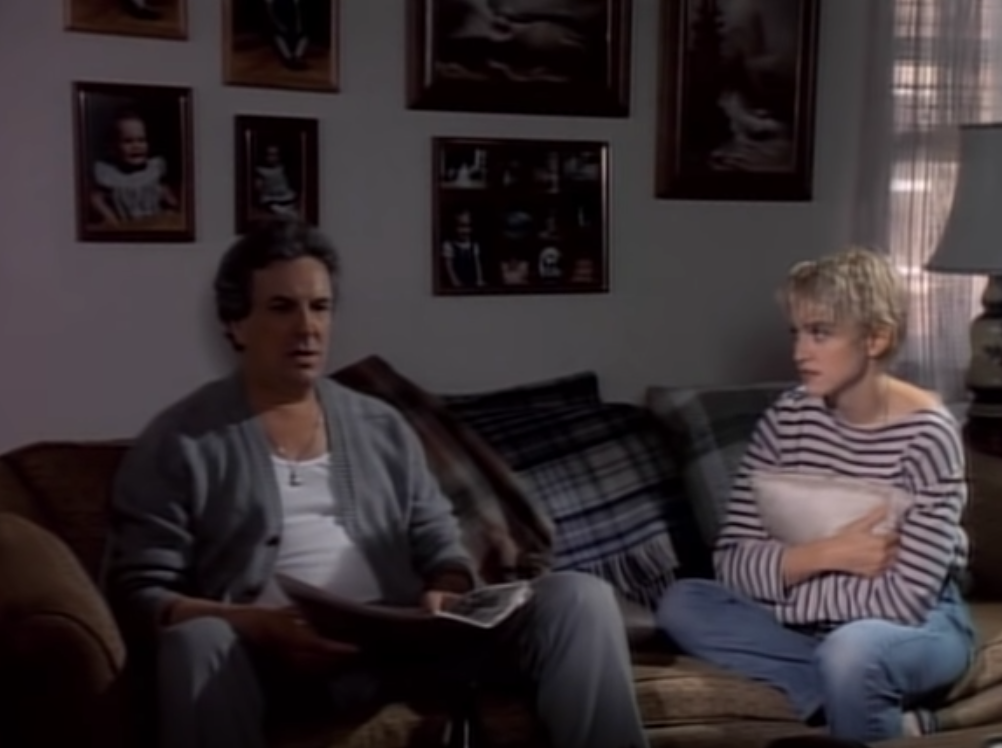As people reflect on Danny Aiello’s film legacy, citing his infamous improv’d line in The Godfather II (“Michael Corleone says hello!”), as well as his roles in Do The Right Thing and Moonstruck (seeming to favor pairing with gay icons), what they’re largely forgetting is how integral he was to the narrative and memorability of Madonna’s video for the controversial 1986 single, “Papa Don’t Preach.” At the time of its release, it left a Reagan-dominated nation in an uproar as it accused Madonna of delivering a PSA in promotion of teen pregnancy. Madonna, who would reflect back on the song in 2009, commented that, more than anything, it “just fit right in with my own personal zeitgeist of standing up to male authorities, whether it’s the pope, or the Catholic Church or my father and his conservative, patriarchal ways. For ‘Papa Don’t Preach’ there were so many opinions [and interpretations]–that’s why I thought it was so great.”
One thing that didn’t need to be left to interpretation was the devotion Madonna’s character felt to her father. Of course, this wasn’t much of a stretch for her considering that most of what has driven her thirst for fame and recognition was wanting her father’s approval, something that increased tenfold upon her mother’s death at the age of thirty, when Madonna was five. Leaving the family in a state of repressed trauma, the vying for attention from the only parent left to give it became a difficult feat in a family of five other siblings to compete with. Madonna was determined to stand out most of all, however. Not just by getting the best grades and causing the most commotion (e.g. a school performance in Godspell in which she wore flesh-colored tights to make everyone think she wasn’t sporting any underwear), but by displaying the neediest and arguably most Electra complex-oriented behavior.
While Madonna wouldn’t really get as candid or macabre about the extent of it until confessing to Sandra Bernhard in the 1991 documentary Truth or Dare that she would have nightmares all the time after her mother’s death and could only be calmed down by crawling into bed with her father (Bernhard asking, “And how was it when you slept with him?” and Madonna replying, “Fine. I went right to sleep. After he fucked me.”), “Papa Don’t Preach” was a major stepping stone on the road to catharsis and redemption. One that likely wouldn’t have been carried off as well without fellow Italian-American Aiello to heighten the dramatic effect of a young woman looking to another man to be her everything in place of her patriarch, the bedrock of where all women get their ideas for how they should be treated in the future.
Interweaving flashbacks Madonna’s character is having of a youth spent being nurtured and cared for by her father, she walks resolutely through the streets of Staten Island wondering how she can possibly tell him that she has unequivocally moved on to a new man by informing him of her pregnancy (or, maybe, her abortion). It doesn’t appear to be words that come easily, as she takes on the wifely role of serving him dinner and then washing the dishes after. Not able to bring herself to spill the news just yet, she instead enjoys another night out with her mechanic boyfriend (played by Alex McArthur), dancing to the inexplicable presence of a three-piece orchestra on the Staten Island ferry.
When she returns the next morning, she finally gathers the will and strength to tell Daddy-o her news. Stunned by the revelation not only that his little girl really is a woman, but also that, on some level, she’s no longer “his,” Aiello as her father delivers the classic Italian silent treatment to express extreme disapproval before giving in to his paternal sensitivities and embracing the daughter he’s lost to a competitor not related to her. It is, without a doubt, a powerhouse performance in his oeuvre that shan’t soon be forgotten by those daughters who know the unparalleled terror and self-hate that can arise as a result of displeasing their father.





















